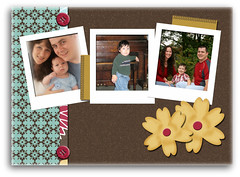Going Back To Basics in German Posted by Constanze on Aug 18, 2016 in Language
Guten Tag! If you’ve ever checked out our archives, you’ll notice this blog has been going for a long time – since 2008, in fact! That means there are many hidden gems of posts that often get lost. Many of these deal with some of the more basic aspects of German language. Sometimes it’s good to refresh our memories and recap the basics! That’s why I’ve compiled this list of posts from our archives that deal with ‘simpler’ topics – telling the time, starting a conversation, conjugating verbs, and so on. Some are older, some are newer, but all are helpful – hopefully having them all here in this post will be an easy way to go over the basics while learning German. 🙂
Enjoy!
One of the first things you learn in German lessons at school are the names of your family members! In this post from 2012, Sandra gives you all the vocab you need to address your family members in German.
Here Larissa explains exactly how to tell the time in German – including that tricky way of saying ‘half past’!
Telling time in German: The quarters of an hour
Another post about telling the time, but with a more specific focus. In this slightly older post, Sandra focuses on the quarters of an hour.
The most important comma rules in German
Something that is often overlooked when learning a language is how to use a comma to break up sentences. What some people don’t realise is that comma rules in German differ to those in English and other languages. So here, Jan tells you how and when to use a comma in German. Helpful stuff!
German grammar in use: The conjugation of the verb ‘machen’
For those of you wanting to brush up on your grammar, we have so many posts in our archives that can help! This is just one post, on the verb machen (to make/do), but if you click on the tab ‘conjugation’ at the bottom of the post, you’ll find many, many more.
Mein, dein, sein, ihr etc.: German possessive pronouns in the nominative case
Want to know how to say ‘This is MY car’ / ‘That is HER book’ / ‘This is OUR house’? Sandra’s helpful post explains exactly that! She tells you how to use possessive pronouns with masculine, feminine and neuter nouns.
This was our most popular post of 2015, which only proves that sometimes the most simple stuff is the most important to people! Numbers 1-100 in German. Direct, to the point – and extremely helpful!
Talking about hobbies in German
This is another one that will surely remind people of their schooldays! From reisen (travelling) to malen (painting) to fishing (angeln), this post will get you chatting about your passions in no time.
The usage of Sie and du in German
One thing that baffles people when they start to learn German are the two ways of saying ‘you’. One is formal, one is casual. This post explains the difference between the two, and when to use them both. Tricky though it may seem, this is, after all, one of the basic things you need to know when learning German!
This is one of those practical posts that will help you in day-to-day life either as a tourist or resident of Germany. Helpfully divided by ‘type’ of food (fruit&veg, meat, dairy etc.), this is one you can literally print off and take to the supermarket with you, should you need quick and easy reference when buying your groceries! There is also a follow-up post here.
Recognising basic Bavarian words and phrases
For those of you interested in German dialects, this is a brief introduction to Bavarian (Bairisch). The words and phrases used are simple, conversational phrases, but this post teaches you to recognise them in Bavarian.
German vocabulary: Around the house
Learning starts at home, and this post takes that motto quite literally. Once you’ve had a look at this post, why not use it to try sticking post-its on different items in your house, with the German vocabulary on them? This is a great idea for visual learners!
Starting a conversation in German
It can’t get more basic than this! Refresh your memory on those key German phrases such as ‘Wie geht es dir?’ (‘How are you?’). This post also uses a handy pronunciation guide, and distinguishes between the formal and informal way of having this conversation with somebody.
Hopefully this post was helpful, and you found a few posts you didn’t know existed! Take a look through our archives or search by keyword on the right hand-side of the blog to find posts by topic. If you can’t find a post on the topic you want to know about, let us know and we will do our best to write one! Are there any ‘back to basics’ topics you want us to cover?
Bis bald!
Constanze x

Build vocabulary, practice pronunciation, and more with Transparent Language Online. Available anytime, anywhere, on any device.
About the Author: Constanze
Servus! I'm Constanze and I live in the UK. I'm half English and half German, and have been writing about German language and culture on this blog since 2014. I am also a fitness instructor & personal trainer.











Comments:
RAUL:
Dear Constanze,
Thank you very much for the compilation of posts. I intend to cover them all during the next days that I’m on holiday. I sure find them very helpful as I studied German when I was a boy and now I want to brush up on it for professional purpose.
Thans again!
Bis bald!
Constanze:
@RAUL Thanks for taking the time to comment, Raul! Reasons like yours are exactly why we wanted to go back over some basics! 🙂 If you come across anything you need further help with, don’t hesitate to let us know. Good luck with your language learning!
Bis bald!
Constanze